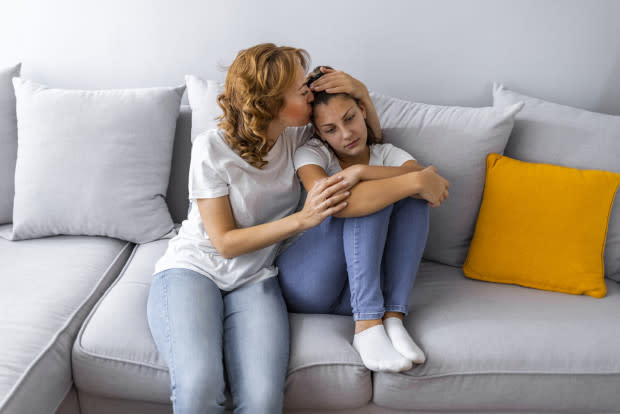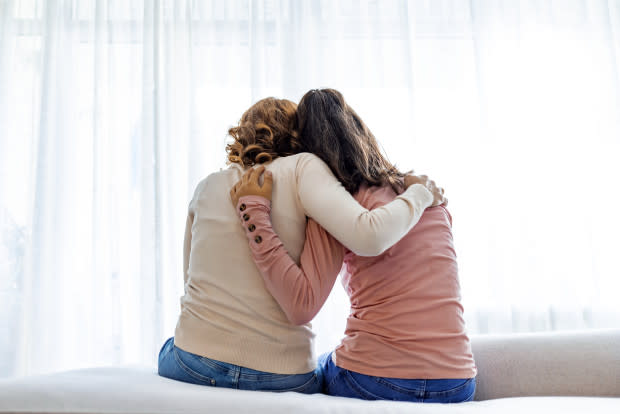All About the Alarming 'Back-To-School Necklace' Term That Parents Need To Know About

The end of summer break is approaching. That means it will soon be normal to hear about all things back-to-school. Shopping is one activity that is common to hear about at this time; after all, going to the store for new school clothes and accessories is exciting for both kids and parents.
But if you hear students discussing back-to-school necklaces, it's important to note that they're not talking about a new, cute piece of jewelry. Instead, it's a troubling phrase (that doesn't seem alarming on the surface) you might hear in conversation or see on social media. So what exactly is a back-to-school necklace? We explain.
Related: 14 Taylor Swift Songs That Reference Depression
What is a "back-to-school necklace"?
On Urban Dictionary, a back-to-school necklace is described as "another name for a noose. This is due to the utter despair you feel when school starts back up again."
Some examples of its use include: "I'm about to buy my back-to-school necklace," "I can't wait to get a back-to-school necklace," "Thinking about that back-to-school necklace," "That back-to-school necklace is calling me," "I can't wait to wear my back-to-school necklace," etc.
So, although a back-to-school necklace sounds innocent enough to those unaware of its real meaning, it is actually a cry for help as it's a code for death by hanging.
But once parents are educated on this term, they are in a better position to help.

How should parents talk about this trending back-to-school necklace phrase with their children?
If you're not sure how to talk about this, Samantha Westhouse, LLMSW, a psychotherapist and maternal-infant health social worker, recommends having your child lead the conversation. "Start off by saying, 'I heard about this thing called back-to-school necklaces—do you know anything about that?'" she advises. "I think an open conversation is always beneficial. It's always important to refrain from judgment so your child feels comfortable sharing how they are feeling."
Just making the effort to check in can go a long way. "Parents should feel empowered to talk to their children about mental health in general," explains Emily Cavaleri, LLMSW, a school social worker and child and family therapist. And in relation to back-to-school conversations, she adds, "Share personal stories about how you felt starting school each year, especially if you had feelings of dread when you were a child. Let them know you will help them work through any feelings or get them professional help if needed."
Related: These 5 Practices Drastically Improve Mental Health
Why is there so much dread as students approach the beginning of the school year?
Some apprehension is understandable as students anticipate adjusting to a new normal after the summer months. "Returning to school can feel overwhelming for a variety of reasons," Cavaleri shares. "Some students struggle with thoughts of a new school, a new teacher, a new schedule, etc. Students are going from sleeping in and a relaxed schedule, to early mornings and busy days."
And oftentimes, these struggles feel insurmountable for students. After all, the CDC has revealed, "More than 1 in 3 high school students had experienced persistent feelings of sadness or hopelessness in 2019, a 40 percent increase since 2009."
"I think it could be a combination of what socialization has looked like the last [three] years on top of the age," Westhouse expands. "If we think about it now, 13-year-olds were 10 when we were all in lockdown. [They were] doing school virtually and missing out on regular clubs, sports and socialization. Add in mass school shootings and what we have experienced in our world over the last few years. It all makes an impact."
What are some warning signs parents should be on the lookout for?
"If someone is using this phrase, there is a high chance that they are struggling with their mental health," Cavaleri says. "Whether your child is seriously contemplating suicide or they use this phrase as a cry for help, signs you may see [include] spending time alone, acting withdrawn, irritability, crying easily and often, sleeping more than usual, difficulty sleeping, loss of interest in things they used to enjoy, giving away belongings, and overall, a change in behavior."
Even if you have not heard your child use this phrase, it may be a phrase they use on their phones, Cavaleri points out. "They may use it via text or social media platforms," she says. "Parents should be aware of their children's electronic use. Students of any age may be using this phrase and having these feelings, so look for signs in your children, from young children to adolescent age."
Related: 21 Things You Should Never Say to Someone With Depression (and What to Say Instead)
What should students know about using or hearing the phrase "back-to-school-necklace" with friends?
"Students should know that using this phrase is very serious," Cavaleri warns. "Joking around about harming yourself and especially killing yourself is not ok. If they are truly having these feelings, they should not feel ashamed and seek help. If students hear or see their friends using this phrase, they should tell an adult, even if their friend tells them not to."
Westhouse agrees, saying that even if your child or teen is quick to brush it off, they should know "that it’s serious, even if they think it’s a joke. I would encourage you to educate your child and if they notice their friends using the phrase to address it with school staff."
Related: 10 Best Mental Health Podcasts

What resources are recommended to help children and teenagers who are feeling overwhelmed by the idea of returning to school?
Parents are able to be the first line of support for their children. The CDC recommends that parents "supervise their adolescent to facilitate healthy decision-making," "spend time with their adolescent enjoying shared activities" and be involved with the school by either volunteering or communicating regularly with teachers and administrators.
Westhouse would also advocate for the schools to have a policy in place to help students. As the CDC reports, before the pandemic in 2019, "approximately 1 in 6 youth reported making a suicide plan in the past year, a 44% increase since 2009."
In order to help your child feel less overwhelmed with going back to school, Cavaleri recommends preparing for school early by "getting organized, visiting the school/walking [their] schedule if allowed, getting sleep and eating healthy."
Ultimately, knowledge is power, and knowing that this is an issue impacting many children and teenagers means that parents can have greater awareness and seek out additional help. Westhouse and Cavaleri both recommend seeking therapy as well as utilizing the new 988 suicide helpline if needed.
Next up: The Caregiver's Guide to Caring for Someone With Depression
Sources:
Emily Cavaleri, LLMSW, school social worker and child and family therapist
Samantha Westhouse, LLMSW, psychotherapist and maternal-infant health social worker
